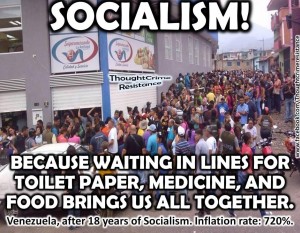So how is that “Free” thing working out for you in the Socialist Utopia of Venezuela?
From YahooNews, “Venezuela, where a hamburger is officially $170“.
Caracas (AFP) – If a visitor to Venezuela is unfortunate enough to pay for anything with a foreign credit card, the eye-watering cost might suggest they were in a city pricier than Tokyo or Zurich.
A hamburger sold for 1,700 Venezuelan bolivares is $170, or a 69,000-bolivar hotel room is $6,900 a night, based on the official rate of 10 bolivares for $1.
But of course no merchant is pricing at the official rate imposed under currency controls. It’s the black market rate of 1,000 bolivares per dollar that’s applied.
But for Venezuelans paid in hyperinflation-hit bolivares, and living in an economy relying on mostly imported goods or raw materials, conditions
are unthinkably expensive.
Even for the middle class, most of it sliding into poverty, hamburgers and hotels are out-of-reach excesses.
“Everybody is knocked low,” Michael Leal, a 34-year-old manager of an eyewear store in Caracas, told AFP. “We can’t breathe.”
– Shuttered stores –

